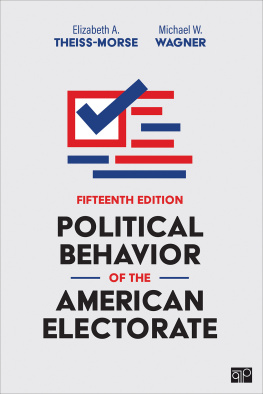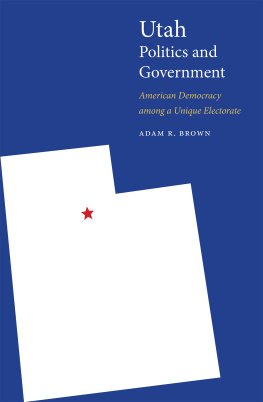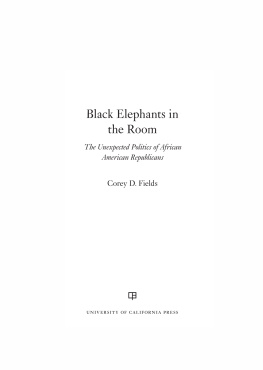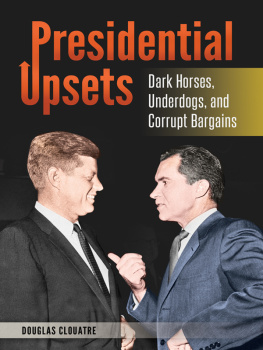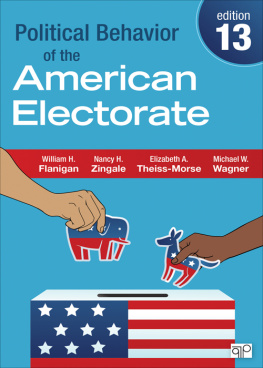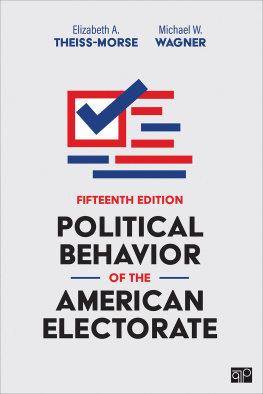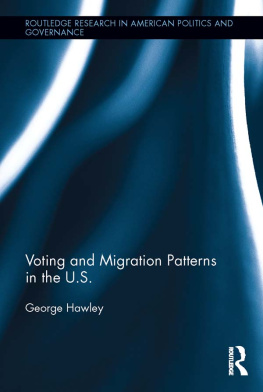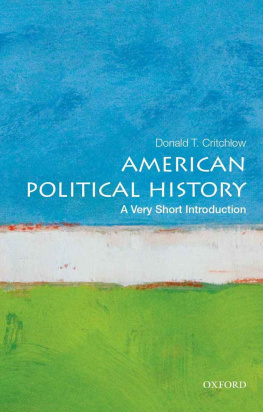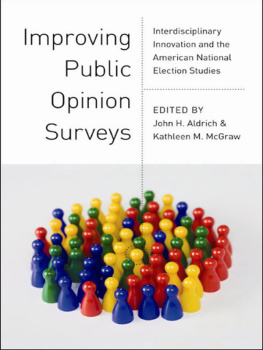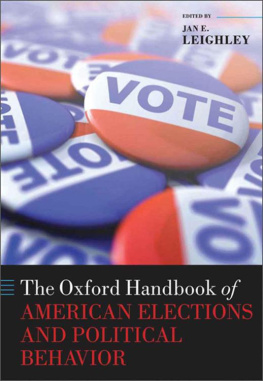Political Behavior of the American Electorate
Fifteenth Edition
This book is dedicated to the memory of Martin Johnson and Michael Combs, both of whom left lasting and poignant legacies.
Political Behavior of the American Electorate
- Elizabeth A. Theiss-Morse
- University of NebraskaLincoln
- Michael W. Wagner
- University of WisconsinMadison
Fifteenth Edition
FOR INFORMATION:
CQ Press
2455 Teller Road
Thousand Oaks, California 91320
Email: order@sagepub.com
SAGE Publications Ltd.
1 Olivers Yard
55 City Road
London EC1Y 1SP
United Kingdom
SAGE Publications India Pvt. Ltd.
B 1/I 1 Mohan Cooperative Industrial Area
Mathura Road, New Delhi 110 044
India
SAGE Publications Asia-Pacific Pte. Ltd.
18 Cross Street #10-10/11/12
China Square Central
Singapore 048423
Copyright 2023 by CQ Press, an Imprint of SAGE Publications, Inc. CQ Press is a registered trademark of Congressional Quarterly, Inc.
All rights reserved. No part of this book may be reproduced or utilized in any form or by any means, electronic or mechanical, including photocopying, recording, or by any information storage and retrieval system, without permission in writing from the publisher.
All third-party trademarks referenced or depicted herein are included solely for the purpose of illustration and are the property of their respective owners. Reference to these trademarks in no way indicates any relationship with, or endorsement by, the trademark owner.
Printed in the United States of America
ISBN: 9781071822173
This book is printed on acid-free paper.
Acquisitions Editor: Scott Greenan
Product Associate: Lauren Younker
Production Editor: Astha Jaiswal
Copy Editor: Melinda Masson
Typesetter: C&M Digitals (P) Ltd.
Cover Designer: Scott Van Atta
Marketing Manager: Jennifer Jones
Acknowledgments
THIS IS our third go-round revising the franchise that Bill Flanigan and Nancy Zingale built. We remain honored and delighted to add to the wonderful work they have done over the decades. We are grateful for the opportunity to put our stamp on this book.
We are indebted to the National Science Foundation (NSF), which funds our primary data source, the American National Election Studies (ANES). The NSFs willingness to champion ANES investigations of what people think, what they want, what they do, and how well they think our democracy is working is crucial to the understanding and improvement of the American experiment.
Given the quick turnaround time between the point that the 2020 ANES data became available and our publication deadline, we relied on an enormous amount of thorough-but-quick research assistance from Rochelle Snyder and Joseph Maestas. We greatly appreciate and admire their professionalism, skill, and speed. We could not have finished the book without them.
As we began the process of making the book our own, we benefited from conversations with many wonderful friends and scholars who generously gave their time and perspectives regarding things for us to think about as we embarked on this journey. We thank Dona-Gene Barton, the late Jim Baughman, Barry Burden, Kathy Cramer, Bill Flanigan, Jordan Foley, Lew Friedland, Amanda Friesen, John Hibbing, Carly Jacobs, Nathan Kalmoe, Jianing Li, Randy Morse, Mallory Perryman, Katie Searles, Dhavan Shah, Kevin Smith, Sergio Wals, Rachelle Winkle-Wagner, and Nancy Zingale.
We also wish to thank Charisse Kiino at CQ Press for asking us to come along on this adventure and for supporting us through it. We thank Scott Greenan for his energy and his helpful editorial hand on this edition. We also thank Lauren Younker, Astha Jaiswal, and Melinda Masson for their quick, professional work that was instrumental in bringing the book to completion. It is a pleasure to work with such wonderful people who are committed to the study of American democracy and to the education of the citizenry.
E. T.-M.
M. W. W.
Introduction
IN THE 2016 PRESIDENTIAL ELECTION, THE RESULT WAS A SURPRISE. Donald Trump, a reality-television star and real estate mogul who had never held elective office, won the presidency via the Electoral College despite losing the popular vote to former secretary of state, U.S. senator, and First Lady Hillary Rodham Clinton. In 2020, it was President Trumps churlish refusal to accept that he had lost that led some of his supporters to attempt a dissident coup at the U.S. Capitol as the Electoral College votes were being certified by Congress, plunging the nation into a bitter acrimony that continues to threaten the foundations of our democratic republic.
After winning acquittals in the U.S. Senate for two separate impeachments in the House of Representatives, facing a historic global pandemic and its associated economic collapse, as well as a summer of Black Lives Matter protests from coast to coast, President Trumps reelection bid mustered 232 electoral votes to Joe Bidens 306the worst performance by an incumbent since 1992. As fellow Democrat Hillary Clinton did before him in 2016, Biden won the popular vote, 51.3 percent to 46.8 percent. While both Trump campaigns for the White House were unique in several important ways, much of what happened can be explained by carefully engaging with what political scientists have discovered about political behavior in the American electorate.
The 2020 Campaign
While the 2016 election was a high-octane ratings bonanza filled with giant rallies and dramatic debates, much of the 2020 election was conducted virtually due to the COVID-19 pandemic. However, the campaign began long before the word coronavirus had entered the American lexicon. President Trump announced his reelection bid on February 17, 2017, barely one year into his first term and before both of his impeachments. Tech entrepreneur Andrew Yang was one of the first Democrats to announce his opposition to the president, doing so in November 2017.

